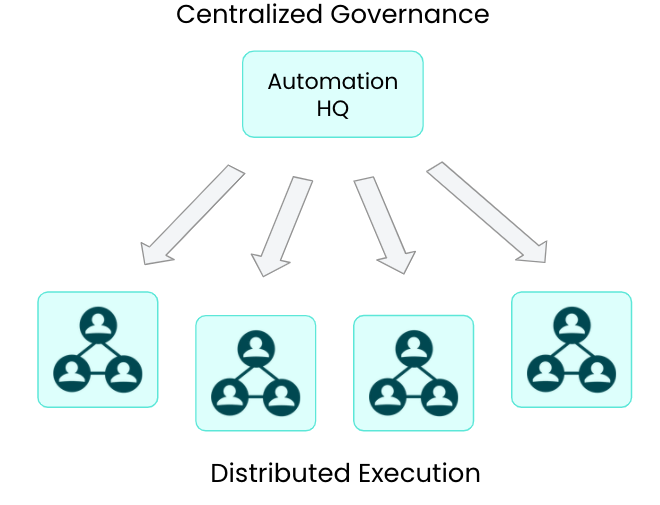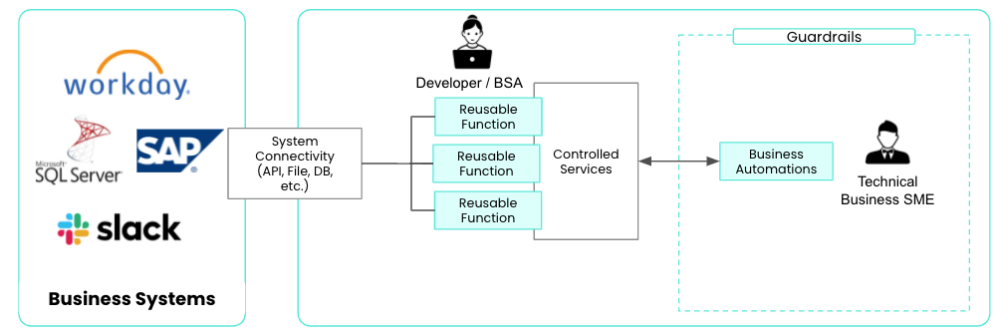Like many buzzwords, “citizen integrator” can mean different things to different people.
Some define it as when anyone, other than a developer, builds integrations; others say it’s only when non-technical employees—across business teams—build integrations.
So what does the term mean, exactly? Why is it only growing in popularity? And how can your organization leverage citizen integrators successfully?
You can read on to learn the answers to each of these questions.

The next phase of iPaaS is here
Learn how an enterprise automation platform can help your business teams integrate and automate at scale.
What is a citizen integrator?
A citizen integrator is when an employee who has more business expertise than technical skills gets involved in building integrations.
To help contrast the level of technical knowledge against business acumen, let’s highlight a few types of roles:

- Integration developers are clearly the most technical in the spectrum, and serve as the traditional integration and automation builders
- Application administrators manage fairly technical projects, but they also have to understand the business use cases for the apps they manage
- Data analysts still skew towards the technical end of the spectrum, as they have to merge, analyze, and build reports off of high volumes of data in order to help business teams make smarter decisions
- Business analysts tip the scales to the other side of the spectrum. These employees are involved in mapping out end-to-end processes for specific lines of business, which requires extensive business expertise
- Technical business subject matter experts are individuals in specific functions who, while they don’t work in a technical role (e.g. recruiter), have fairly technical skills relative to their peers (e.g. fluent in excel)
- Non-technical business users consist of employees who don’t work in a technical capacity and are generally more limited in their technical knowledge relative to peers
Based on this spectrum, we’d define a citizen integrator as someone who works as a business analyst, or who’d be considered either a technical business SME or a non-technical business user.
Related: A guide to citizen automation
Why are citizen integrators important?
The main benefits of having citizen integrators are two-fold: business agility and expertise. Let’s explore each in detail.
They increase your business’ agility
If your organization is like most, it’s facing hundreds of integration and automation opportunities across business teams. In addition, these opportunities will continually evolve as the needs and wants of your key stakeholders—employees, clients, prospects—change.
Given how small your standard development team likely is (i.e. a handful of integration developers), they’ll struggle to build and maintain the high volume of integrations and automations that your business requires. Moreover, the prospect of building integrations and automations quickly in order to accommodate to changing needs will be equally, if not more, challenging for them.
Adding citizen integrators into the mix solves for the challenges above, as these builders increase your organization’s capacity for implementing integrations. In addition, their inclusion allows IT and engineering to focus more on the business-critical tasks that they’re uniquely qualified to handle.
They deliver more impactful integrations
Citizen integrators’ expertise in their areas of work can prove invaluable, both in prioritizing the integrations that get implemented and in deciding how they’re executed. Also, since citizen integrators often work in the apps they integrate and are directly impacted by the automations they build, they’re more likely to address any issues or areas of opportunity with greater urgency than, say, a colleague who works in IT.
Related: A guide to automation governance
How to enable citizen integrators without compromising your business
Citizen integrators can clearly play a big role in the success of your organization’s integration initiatives, but including them in the process requires that you put the proper governance, compliance, and controls into place. If these items get ignored, citizen integrators (along with the rest of your integration builders, for that matter) can implement integrations and automations that inadvertently harm your business. And while not all poorly-executed integrations and automations require extensive rework or come at a high cost, many do. For example, an automation can result in customers and employees receiving confidential business information via email.
To help citizen integrators build integrations quickly and in the ways they see fit, while ensuring they follow certain standards and best practices, you can implement some version of the following:

At the very top, you have an “Automation HQ,” which consists of a centralized group of employees in IT and engineering who govern and enable your citizen integrators.
Your Automation HQ can manage the roles and permissions of citizen integrators at the user level; in addition, they can provide training sessions, automation templates, support (e.g. channel in Slack), etc. to ensure that citizen integrators feel confident in their abilities and follow the organizations’ standardized approach to building integrations and automations.
On top of this centralized governance model, you can set up guardrails where citizen integrators can’t touch critical data or access confidential information.

Here’s how it can work: Employees in your Automation HQ use an enterprise automation platform to integrate systems and build reusable functions, which allow citizen integrators to retrieve specific data as part of their automations. The data that’s retrieved, however, can’t be sensitive and it can’t be modified.
Related: 3 platform features that are required to automate at scale
Automate at scale with Workato
Workato, the leader in enterprise automation, provides all of the governance and security features that’s needed to keep data safe and your business compliant with the most stringent of data privacy and protection measures. In addition, the platform provides a low-code UX, hundreds of pre-built connectors, and thousands of automation templates (“recipes”) so that your citizen integrators can integrate and automate quickly and effectively.
